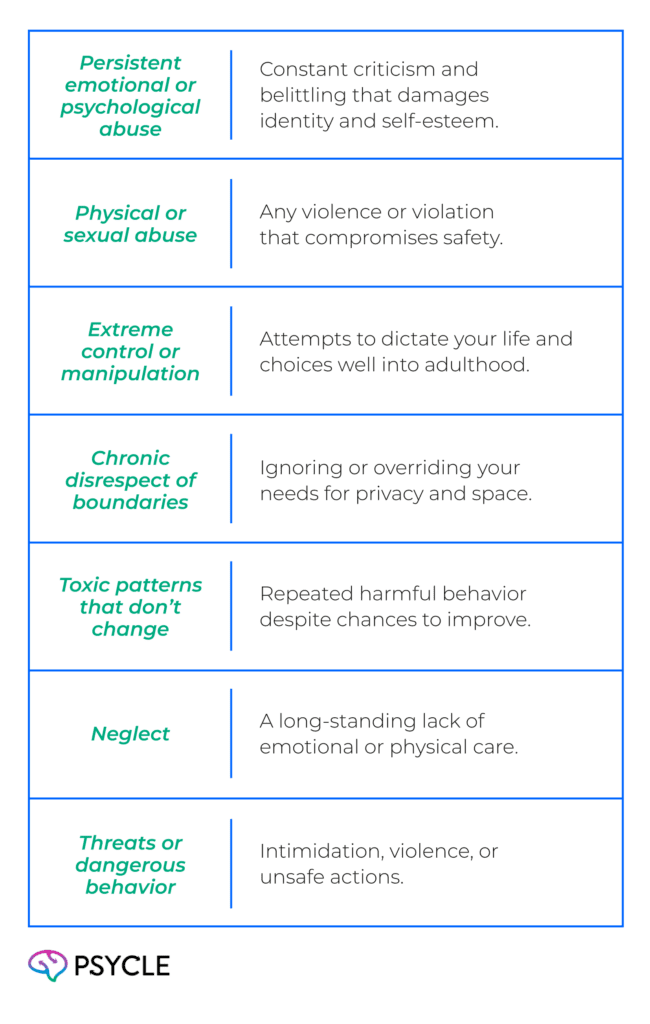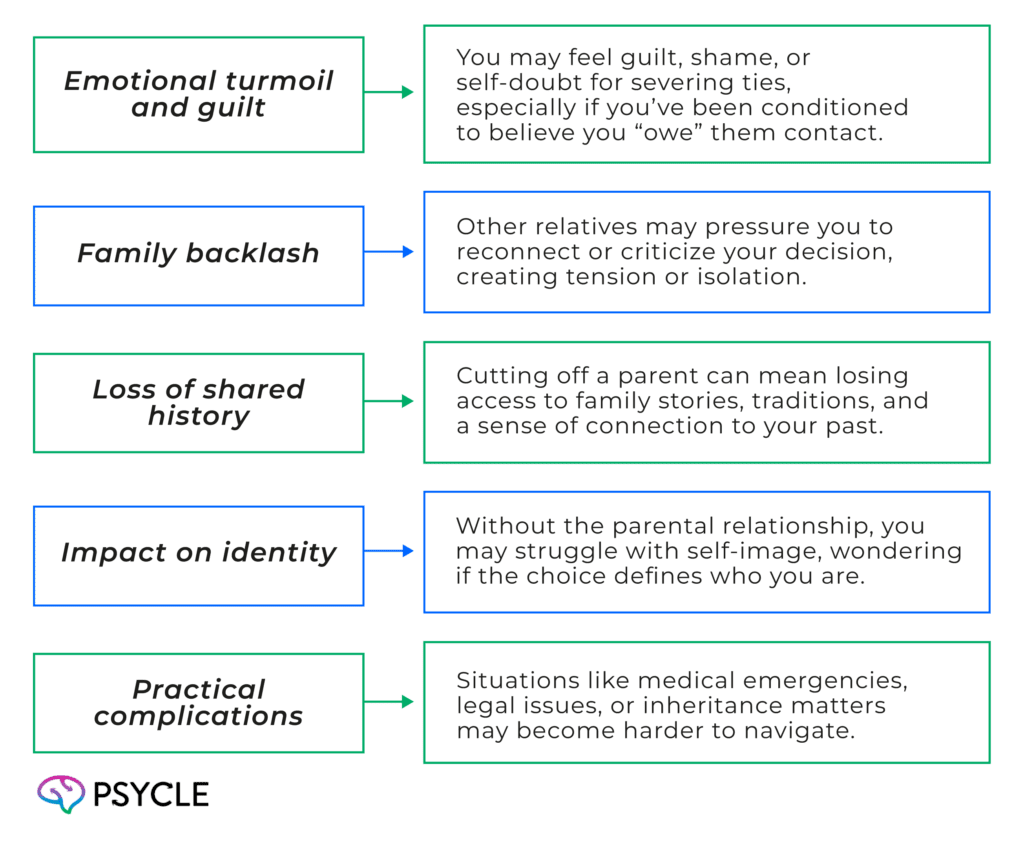Cutting off a parent is one of the most difficult and emotionally charged decisions you can make. The process becomes even harder when friends, relatives, or even the parents themselves try to pull you back in.
This guide will discuss why people cut ties with their parents, the potential consequences, and how to go about it while maintaining safety and emotional well-being.
Key Takeaways
- Cutting ties with a parent is often a last resort after repeated harm, abuse, or boundary violations.
- Explore alternatives like therapy or reduced contact first if it feels safe and possible.
- Keep the separation process clear and intentional—avoid drawn-out emotional debates.
- Prepare for consequences like guilt, family backlash, and identity shifts by having a strong support network.
- Set and maintain boundaries with both the parent and anyone who pressures you to reconnect.
Why Cut Out a Relationship With a Parent?
Ending a relationship with a parent is never an easy choice. For most people, it comes after repeated experiences of harm, disappointment, or disrespect that make the relationship feel unsafe or unhealthy. This decision is often driven by a need to protect one’s mental health and personal boundaries.
While every situation is unique, some common reasons include:

Abuse can also be targeted at your partner or children. If this happens, you may need to cut ties to keep your loved ones safe.
Is Cutting Out a Parent the Right Thing to Do?
Deciding whether to cut a parent out of your life is deeply personal, and there’s no universal answer on whether it’s right or wrong. For some, it’s the only way to protect their well-being; for others, different approaches may be worth trying first.
Before making such a permanent choice, consider whether there are steps you can take to address the harmful behavior without ending contact entirely. This might include family therapy, setting firm boundaries, limiting the amount of time you spend together, or communicating specific changes you need to feel safe.
It’s also important to take an honest look at your own role in the relationship. Are there patterns in your behavior that might contribute to the conflict? Is your parent being given a fair chance to express their perspective and be heard? Self-reflection can help ensure that the decision comes from a balanced and thoughtful place, rather than from a single moment of anger or frustration.
Exploring these options first can prevent he emotional fallout of estrangement and may even open the door to a healthier relationship. However, if your parent refuses to engage in these efforts, or if you’ve already tried and nothing has changed, then no contact may be the healthiest choice. You can always reverse the decision if they show a willingness to respect your boundaries and make meaningful changes.
How to Cut Out a Parent
There’s no “best practice” for cutting out a parent. But there are things you can do to make the break as clean as possible, and protect your emotional health in the process.
Practical Steps
If you decide to tell them directly, keep it simple. A clear statement that you will no longer be in contact is enough, and you don’t need to justify your decision or get drawn into an emotional debate. If it feels important for your own peace of mind, you can write a thoughtful letter or message explaining your reasons. Just be sure not to send it while you’re feeling emotionally charged. Give yourself time to cool down, review your words, and confirm that they truly reflect what you want to say.
From there, remove or block them on phone, email, and social media to prevent unwanted outreach. If you share mutual contacts, consider what information you are comfortable being passed along, and limit your presence in shared spaces, both physical and digital.
For those living together, create an exit plan that includes secure housing, financial arrangements, and any necessary legal protections.
Be Prepared for Negative Consequences
Here are some fallouts you could expect:

Have a Support Network in Place
To cope with potential consequences, it’s important to have a support network of trusted friends or chosen family in place. They should be able to listen to your decision without judging or trying to change your mind. You can participate in activities such as local clubs and meet-ups to widen a network of like-minded people.
Professional therapy plays a crucial role, too. A therapist can help you work through feelings of grief, guilt, and struggles with your identity. You can also reclaim a sense of tradition and identity through your long-standing connections to friends, work, communities, and hobbies.
Set Clear Boundaries
When cutting off a relationship with a parent, it’s essential to set firm boundaries, both with them and friends or family members who might pressure you into reconciling.
Clearly communicate your decision in direct, respectful language, stating that you are not open to contact and that this choice is final for the foreseeable future. If others attempt to intervene, calmly repeat your boundary without engaging in debates or explanations. If necessary, block or mute communication channels to protect your space.
Final Words
Cutting off a parent is a deeply personal and often painful decision, usually made after repeated harm or boundary violations. It can bring emotional fallout, family backlash, and practical complications, but for some, it’s the only path to safety and healing. By making a thoughtful plan, preparing for the consequences, and setting firm boundaries with both the parent and those who may pressure you, you can protect your emotional wellbeing and move forward with greater peace.
FAQs
I Don’t Want to Be in Contact With My Parent, But They’re Dependent on Me to Care For Them. What Should I Do?
If your parent relies on you for care, you may need to separate your role as their caregiver from your role as their child. Look into alternative arrangements—such as home health aides, assisted living, community programs, or state resources—that can meet their needs without requiring direct involvement from you. If you’re legally responsible, you may still be able to delegate the caregiving to professionals. Setting boundaries doesn’t mean neglecting their basic needs; it means ensuring their care is managed in a way that protects your wellbeing.
Sources
- https://www.scientificamerican.com/article/cutting-a-parent-out-of-your-life-isnt-always-the-right-solution/
- https://www.oprahdaily.com/life/relationships-love/a44677129/owning-our-struggles-with-a-toxic-parent/
- https://www.psychologytoday.com/gb/blog/tech-support/201712/4-steps-to-healing-after-cutting-a-parent-out-of-your-life

